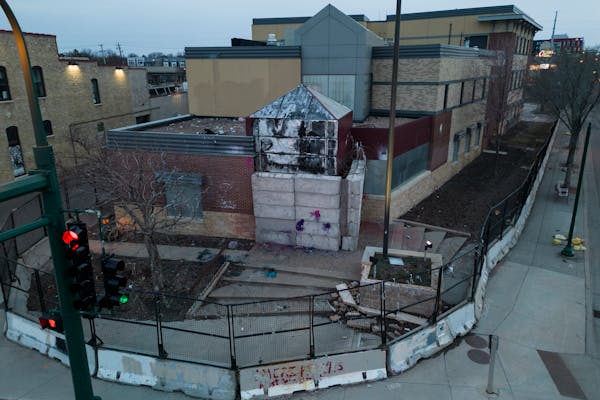The Minneapolis City Council suddenly tapped the brakes Thursday on a plan to move the city's Third Precinct headquarters to a building downtown — the same plan that the same council members had all but approved two days earlier.
Several council members on Thursday said they didn't understand how much money it would actually cost and whether it was a wise use of funds — and they were surprised when a senior city staffer explained that officers could be stationed there for 10 years.
It's unclear if the plan is now in real jeopardy or whether council members simply need more time to understand what they were on the verge of voting for; officially Thursday, all members present voted to send the plan back to a committee for more discussion.
The issue
The current police station was ransacked and set ablaze during protests that turned violent. The charred building remains, boarded up and cordoned off by razor wire. The officers who used to work there continue to operate out of makeshift quarters in a downtown office building, where parking is scarce, accommodations are widely seen as inadequate and response times to the southernmost reaches of the precinct can be challenging.
Few think the status quo is working.
The city had narrowed options for a new location to two — rehabbing the original station or building a new one on a city-owned vacant lot nearby — but that binary choice drew spirited opposition from some in the southeast Minneapolis communities served by the precinct.
The plan
In July, Mayor Jacob Frey and Council President Andrea Jenkins held a news conference with police brass to announce a new option: buy space in the downtown Century Plaza building, where the city was already purchasing space to relocate the First Precinct, which also suffers from inadequate quarters. The First Precinct relocation is moving ahead.
Frey, who credited Jenkins with coming up with the idea, said the Third Precinct could occupy the building in the "medium term," suggesting a permanent solution was still the goal. The obvious knock against Century Plaza was that it was just outside the boundaries of the precinct — and well away from some parts of it.
But it seemed to have widespread support, and the council in a 12-0 vote gave the green light for staff to pursue it, although details, such as the cost, were unknown.
What happened Tuesday
On Tuesday, the full City Council met as a Committee of the Whole — a regular procedure generally intended to hash things out as a group so that the formal meeting of the full council has few surprises.
In Tuesday's meeting, council members learned new details:
The entire cost of moving both precincts into the building at 1100 Fourth Av. S. would come to about $41 million, some $25 million more than when only the First Precinct was in the mix.
The city hopes to eventually be reimbursed for up to $11 million from the Federal Emergency Management Agency, which declared an emergency during the uprising that followed Floyd's murder.
Officers from the Third Precinct could relocate in January 2025.
Council members asked questions and seemed satisfied. They agreed, without any of the 12 present objecting, to move the issue along, leaving observers to assume Thursday's vote — the official approval to purchase the additional space for the Third Precinct and the shell area — was all but assured.
Whiplash Thursday
On Thursday, interim City Operations Officer Heather Johnston stood for questions on the plan, and it quickly became clear there were problems.
"It's my understanding this is being built as a temporary space for the officers, which I am in full support of," Council Member Emily Koski said.
Johnston clarified the time frame, call it "long-term temporary. We're anticipating it will be 10 years."
That seemed to surprise a number of council members.
"I don't think 10 years is probably the expectation of constituents," Council Member Andrew Johnson said. "I think they would like the station returned sooner."
Council members also struggled to understand how to compare the cost of the Century Plaza plan with the previous options, and several, for the first time publicly, said they felt rushed.
In the end, council members voted to delay the matter. It's unclear how long that will take, but several said they will need more time than the council's normal two-week cycle.
Police Chief Brian O'Hara has avoided taking a position on any one location. "The location of the Third Precinct building is a decision for the governing body to make with input from those residents who are most affected," he said in a statement Thursday. "I do believe that the residents of the Third Precinct are entitled to the same access to police services as all other city residents. That includes access to a precinct station house within the geographic confines of the Third Precinct."

Want to share info with the Star Tribune? How to do it securely

'Safe recovery sites' would offer syringes, naloxone and more to people using drugs. The plan could be in peril.
New Minnesota GOP leaders seek peace with party's anti-establishment wing

Who is Republican Lisa Demuth, Minnesota's first House speaker of color?

